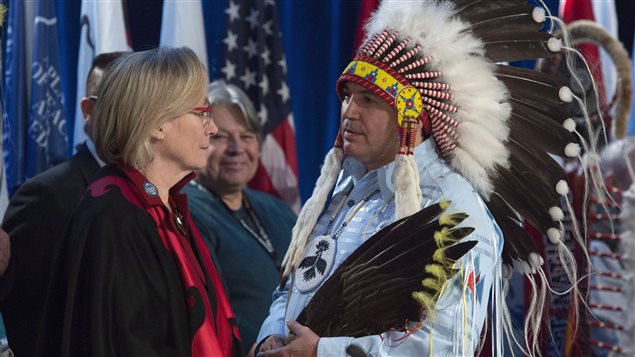Hundreds of Indigenous leaders from across Canada are meeting in Saskatchewan today to discuss the ongoing suicide crisis, the beleaguered inquiry into missing and murdered Indigenous women and troubled relations with various police forces.
The three-day annual meeting of the Assembly of First Nations (AFN) in Regina will also be attended by several federal cabinet ministers, including Justice Minister Jody Wilson-Raybould, Indigenous Affairs Minister Carolyn Bennett, Public Safety Minister Ralph Goodale and Environment Minister Catherine McKenna.
The meeting of the AFN, a national advocacy organization representing First Nation citizens living in over 630 aboriginal communities, kicked off with an address from National Chief Perry Bellegarde.
Bellegarde urged the federal government to act on a wide range of topics: from addressing racism and discrimination against Indigenous Canadians, to ensuring adequate funding for Aboriginal child support programs, revitalisation of Indigenous languages, settlement of land disputes and support for the United Nations Declaration on the Rights of Indigenous Peoples, which the Liberal government of Prime Minister Justin Trudeau fully endorsed in May 2016, a decade after it was adopted by the world body.
Focus on children
“Our theme for this Assembly is something that all of us have in our hearts and in our minds everyday – ‘Our Priority: Our Children, Our Future,’” Bellegarde said. “It’s why we do what we do every day to make life better for our children. To create a world where there is a better future, one where our human rights, inherent rights, collective rights, our Treaty rights are respected and not something that we have to fight for every day.”
Every child has a right to a safe and healthy home and to grow up in a society where they are treated with dignity and respect and have the same opportunities as other children, he said.
“And so my first message this morning is for Canada: this has to end,” Bellegarde said. “The racism, the discrimination, the poverty. These are not just First Nations problems.”
These problems are Canada’s problems and the federal government and Indigenous leaders must work together to solve them, Bellegarde said.
Protecting and promoting Indigenous languages
The protection and promotion of Indigenous languages is another key point for Canada’s Aboriginal communities, Bellegarde said.
“There are more than 58 distinct Indigenous languages and none are considered safe,” Bellegarde said.
“The recognition, promotion, and recovery of our languages is a vital part of self-determination. It is vital to our Nations’ cultures and central to our songs, our stories, and our ceremonies.”
Healing centuries of pain
Bellegard also highlighted the suicide crisis that affects many Indigenous communities.
“We grieve and we are angered when we hear the statistics – that the leading cause of death for a First Nations person under the age of 44 is self-harm,” Bellegarde said. “I don’t think there is anyone among us who has totally escaped the shock of loss of a loved one or a friend or relative or someone we’ve known.”
Solutions to these difficult problems much come from within First Nation communities, he said.
“As leaders, we cannot be afraid to talk about what’s happening to our children and among our families,” Bellegarde said.
Aboriginal leaders are well aware of the causes of this crisis, Bellegarde said as he enumerated a litany of problems Indigenous communities: the intergenerational effects of the Residential Schools system, colonization and loss of control of their governments and their own lives, the lateral violence, the depression, substance abuse to numb the pain, loss, physical, sexual and emotional abuse, and incest.
“These are ugly words,” he said. “But we cannot be afraid to speak them. We cannot be afraid to listen when someone says them.”
‘Building a new relationship’
The national chiefs will also hear from the UN Special Rapporteur on the Rights of Indigenous Peoples, Victoria Tauli Corpuz, who will address the gathering today.
Federal Conservative leader Andrew Sheer, who represents the federal riding of Regina-Qu’Appelle, also addressed the Indigenous leaders.
“As the Leader of Canada’s Conservatives and the Official Opposition, I am determined to build a relationship with Indigenous peoples based on mutual respect, trust, and a desire to create prosperity and opportunity for everyone in our country,” Sheer said.
The Conservative Party wants to see Indigenous peoples play a greater role in Canada’s economy, creating the conditions for better education, more employment and opportunity on and off reserves, he said.
“Though we may not have an exact map for the road ahead, we all know where we want to end up,” Sheer said. “In a Canada where every child of Indigenous heritage has the exact same opportunity as any other Canadian child, a Canada where First Nations families can live without worry for their security for their future.”







For reasons beyond our control, and for an undetermined period of time, our comment section is now closed. However, our social networks remain open to your contributions.